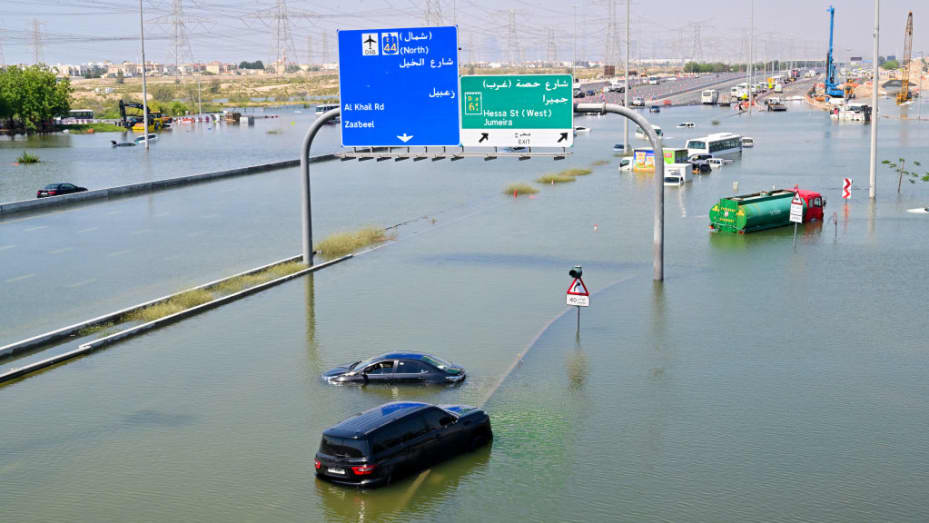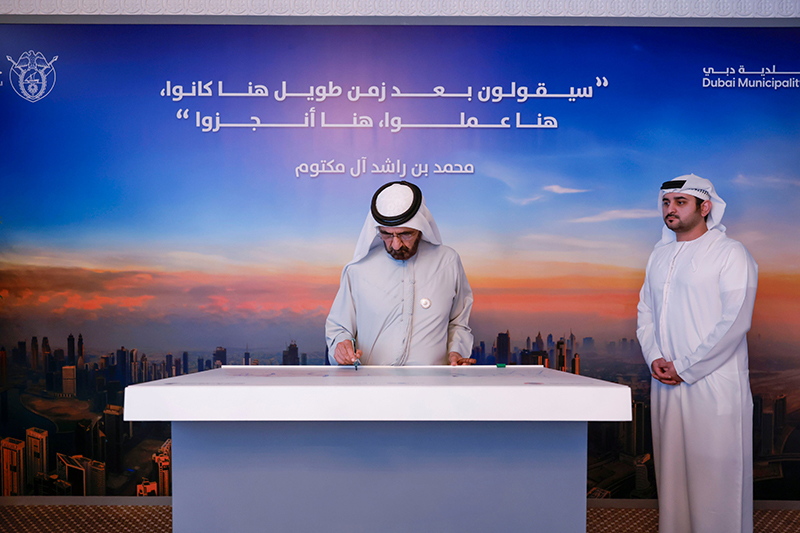Dubai: A Dh30 billion project to enhance the emirate’s rainwater drainage network has been approved.
His Highness Sheikh Mohammed bin Rashid Al Maktoum, Vice President and Prime Minister of the UAE and Ruler of Dubai, sanctioned the project—dubbed ‘Tasreef’—on Monday. This initiative represents the largest single-system rainwater harvesting project in the region.
About Tasreef – Rainwater drainage project in Dubai
The Tasreef project is set to be the largest rainwater collection project of its kind in the region. According to the Dubai Media Office, it will cover all of Dubai and will meet the emirate’s needs for 100 years.

The project was approved in the presence of Sheikh Maktoum bin Mohammed bin Rashid Al Maktoum, First Deputy Ruler of Dubai, and Deputy Prime Minister and Minister of Finance of the UAE; and Sheikh Ahmed bin Mohammed bin Rashid Al Maktoum, Second Deputy Ruler of Dubai.
The project is designed to increase the emirate’s rainwater drainage capacity by 700 per cent and enhance its readiness for future climate challenges.
. @HHShkMohd approves AED 30 billion 'Tasreef' project to expand Dubai's rainwater drainage capacity.
— Dubai Media Office (@DXBMediaOffice) June 24, 2024
Project to be implemented immediately; phased completion by 2033. #Dubai pic.twitter.com/5brtbhqWhT
The comprehensive project will cover all areas of Dubai, capable of managing more than 20 million cubic meters of water per day, and is projected to serve the city for the next 100 years.
The project will help Dubai be prepared to face all climate-related challenges and will enhance the safety and security of UAE residents and citizens.
Sheikh Mohammed has directed the immediate start of the project, which will be executed in phases and is expected to be completed by 2033.
In his post on X, Sheikh Mohammed stated, “Dubai will continue to enhance its infrastructure and urban achievements, ensuring the safety and security of everyone living within its borders.”
“Today, we approved an integrated project to develop Dubai’s rainwater drainage network at a cost of Dh30 billion. The largest rainwater collection project in a single system in the region, the initiative will increase the capacity of the drainage network in the emirate by 700 per cent, ensuring the emirate’s readiness to face future climate-related challenges,” Sheikh Mohammed said.
“Covering all areas of Dubai, the project will raise the drainage network’s capacity to more than 20 million cubic metres of water daily, meeting our needs for the next hundred years. We have directed the immediate implementation of the project, which will be completed in phases by 2033. Dubai continues to drive infrastructure and urban advancements, enhancing safety and security for everyone living in the emirate.”
The strategic project is a continuation of drainage projects launched by Dubai in 2019, covering the Expo Dubai area, Al Maktoum International Airport City, and Jebel Ali.
Massive capacity
The ‘Tasreef’ project aims to enhance rainwater and surface water drainage services with a sophisticated and highly efficient infrastructure, improving operational efficiencies and reducing costs associated with station construction, operations and maintenance by 20 per cent and increasing the network’s lifespan.
Furthermore, the rainwater drainage system will have a capacity of 20 million cubic meters per day through tunnels, with a flow rate of 230 cubic meters per second, making it the largest single-system rainwater collection project in the region.
Advanced tunnelling equipment
The project will employ the latest Tunnel Boring Machines (TBM), which are the largest in the Middle East. Renowned for their efficiency, speed, and high precision in excavation, these machines can handle diverse topographical conditions. They are equipped with automated control systems for continuous monitoring and data analysis, as well as advanced safety systems to ensure the protection of workers and equipment.
You might also like: A major new bridge has been built in Dubai to greatly reduce traffic
According to the National Centre of Meteorology (NCM), the exceptional storms and torrential rain in April set a new record, marking the heaviest rainfall in 75 years. This surpassed all previous records since data collection began in 1949, making it the most rainfall ever recorded in a 24-hour period, as per NCM.





